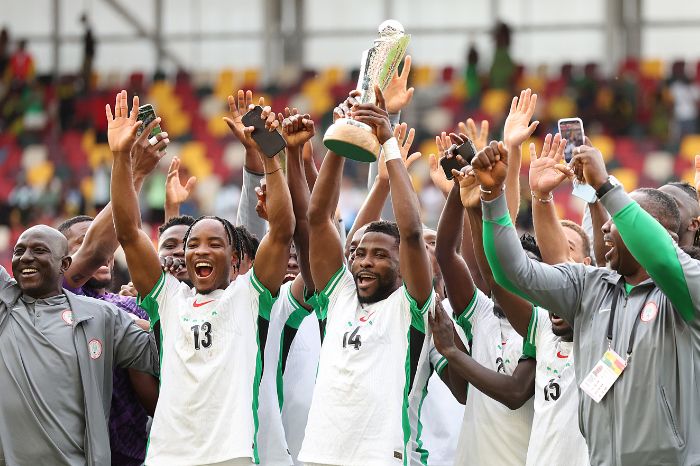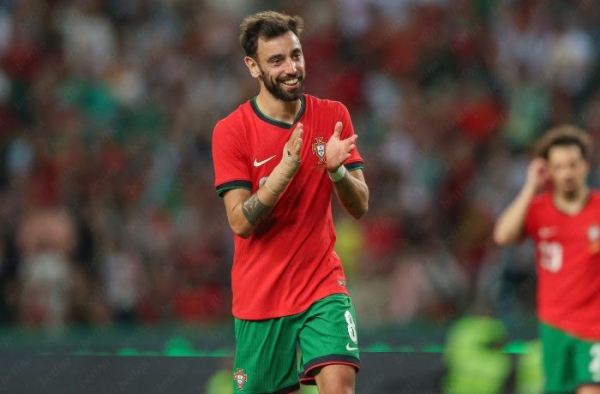Twenty-one years after winning the last edition of the Unity Cup, Nigeria were once again the victors as they defended the title in the competition’s first tournament since 2004. The Super Eagles showcased superb determination, flair and quality as they marched to the trophy once again, and there was plenty to take from their performances.
Here are five key lessons from Nigeria’s triumphant Unity Cup campaign:
New tournament. Same goal ?
— Bet9ja: The home of #betBOOM! ? (@Bet9jaOfficial) May 20, 2025
Bet9ja are proud to be the official sponsor of @NGSuperEagles 2025 AFCON campaign!
Let’s Do It Again, Super Eagles ??? pic.twitter.com/4V91lWcCSN
Giving New and Returning Players a Chance Pays Off
Nigeria were without several usual starters for the Unity Cup due to club commitments, meaning a host of new and returning players were given the chance to wear the Super Eagles shirt.
This certainly paid off, with the likes of Christantus Uche, Nathan Tella and Cyriel Dessers all starring as Nigeria marched to the trophy – a sign that the Super Eagles could benefit from handing these players a chance in their upcoming World Cup qualifiers.
Cyriel Dessers Proves He Is Ready For the Senior Squad
Despite playing for one of Europe’s most historic clubs in Rangers, Dessers has had very few opportunities to wear the Super Eagles kit, making just eight appearances and still yet to make his competitive debut for his country.
However, the striker may have proved to Eric Chelle that he is ready for a call-up to competitive action, as Dessers scored the opening goal in Nigeria’s 2-1 victory over Ghana in the semi-final, before delivering a crucial assist for Moses Simon’s goal against Jamaica in the final.
Ability To Perform Under Pressure
Nigeria proved that they can perform under pressure throughout the Unity Cup, with the Ghana and Jamaica fans both extremely vocal in their support for their respective nations in their two clashes, while they also lifted the trophy after winning a penalty shootout.
The Super Eagles held their nerve to score all five penalties, with Kelechi Iheanacho, Moses Simon, Tolu Arokodare, Bruno Onyemaechi and Christantus Uche all converting, as they defeated Jamaica 5-4 on spot kicks.
Tactical Adaptability
Nigeria have often switched formations and tactical systems in recent years, from adopting a three-defender system to employing the classic 4-4-2 and 4-2-3-1 formations, enjoying plenty of success in each.
However, Chelle adapted once again for the Unity Cup, as Nigeria lined up in a 4-3-3 formation that included usual winger Nathan Tella starting as one of three central midfielders, alongside Wilfred Ndidi and Frank Onyeka.
This highlights the tactical adaptability and creativity of Chelle and his players, an extremely useful tool to have in competitive matches as they can change and switch at any point throughout a match in order to solve a host of situations and problems.
What a journey for Benjamin Fredrick ???
— Bet9ja: The home of #betBOOM! ? (@Bet9jaOfficial) June 2, 2025
? 2021: Graduates from Moses Simon’s Simoiben Academy
? 2024: Signs for Brentford
? 2025: Makes his Super Eagles debut at Brentford’s stadium… alongside Moses Simon ?
Full circle ? pic.twitter.com/q6qfPqda1W
Unity and Team Spirit
True to the nature of the Unity Cup, which brings together nations to celebrate the football and culture of those respective countries, Nigeria’s campaign was fuelled by strong camaraderie and collective determination on and off the field.
The love and support of the Super Eagles fans was clear to hear as they pushed the players to eventually lift the trophy, while clear bonds on the pitch enabled a fast-flowing and exciting style of play on the pitch.
Conclusion
In conclusion, there is plenty that can be learned from Nigeria’s Unity Cup triumph, and Chelle will be looking to take plenty of those lessons forward as the Super Eagles continue their fight to qualify for the 2026 FIFA World Cup.
The Super Eagles are next in action on Friday against Russia – bet on the most markets in Nigeria for this big match! Bet here!



